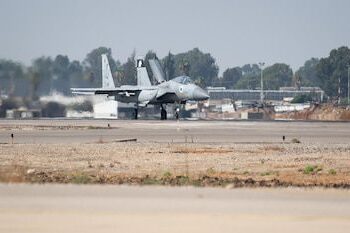Hodeida, Yemen: In a significant escalation of regional tensions, Israeli airstrikes targeted key Houthi-controlled installations in the Yemeni port city of Hodeida, leaving at least four dead and 49 injured. The strikes mark the latest development in a rapidly intensifying conflict between Israel and the Houthi movement, a group accused by Israel of acting under Iranian influence.
The airstrikes, which hit civilian and military infrastructure, are a direct response to recent missile attacks launched from Yemen into Israeli territory. Israel’s Defense Forces (IDF) confirmed a large-scale aerial operation, citing the need to neutralize Houthi capabilities to wage war against the state of Israel.
Why Israel Targeted Hodeida: Strategic Implications of the Airstrikes
Israel’s airstrikes on Hodeida—located over 1,800 kilometers from its borders—are notable for both their scope and their strategic importance. Hodeida’s Ras Issa port and surrounding areas are crucial to the Houthi military effort, serving as a hub for importing petroleum and allegedly, according to Israel, military equipment smuggled in from Iran.
Israeli officials have long accused the Houthis of being a proxy force for Iran, alleging that the group receives financial and military backing from Tehran, which is keen to extend its influence in the region. According to Israel, this pipeline of support enables the Houthis to acquire missile technology and other weapons, which they then use against Israeli targets. “The Houthi regime’s attacks on Israel are part of a larger effort, coordinated by Iran and regional militias, to destabilize the region,” the Israeli government noted.
By targeting oil infrastructure, including the fuel depots at Ras Issa and Hodeida, Israel aimed to cut off a key resource for the Houthi forces while also disrupting the group’s ability to support Iran’s regional ambitions. The airstrikes were designed to halt the supply chain of oil and arms, which Israel claims are vital for Houthi military operations.
In response, Houthi officials have condemned the attacks, accusing Israel of deliberately exacerbating the humanitarian crisis in Yemen by targeting civilian infrastructure. A statement from the Houthi-controlled Supreme Political Council warned that Israel’s actions would provoke retaliation.
A Coordinated Effort: U.S.-Israel Military Cooperation
An important dimension of the airstrikes is Israel’s coordination with the United States. According to sources within the Israeli Defense Ministry, the operation was carried out in collaboration with the U.S. Central Command (CENTCOM). The cooperation underscores the broader geopolitical stakes of the conflict, linking Israeli military strategy with American efforts to maintain stability in the Middle East.
U.S.-Israeli cooperation reflects a growing concern about freedom of navigation in the Red Sea, which is increasingly threatened by the Houthi movement. Hodeida, Yemen’s key western port, sits along critical shipping routes that facilitate global oil trade. By targeting this region, Israel is signaling its commitment to safeguarding these routes from what it views as Iranian proxies.
Humanitarian Impact: Civilian Casualties and Infrastructure Damage
While the Israeli government emphasizes the necessity of its military actions, the human toll is mounting. According to Yemeni media outlets aligned with the Houthi movement, the strikes killed three engineers working at the Al Hali power plant and a worker at the port, in addition to wounding 49 others. These casualties underline the high civilian cost of military strikes that, while aimed at military targets, also affect essential infrastructure.
The targeted power stations—including those at Al Hali, Ras Kazib, and Mina—are crucial for Yemen’s already fragile energy grid. Damaging these facilities risks worsening the humanitarian situation in a country that has faced years of war, famine, and disease.
Houthi officials claim they had taken steps to mitigate the damage by emptying fuel depots before the strikes, but the broader economic impact of the attacks is still being assessed.
The Broader Context: Houthi Missile Strikes and Regional Instability
The Israeli airstrikes come on the heels of missile attacks launched by the Houthis into Israel. These missile strikes, part of a growing pattern of Houthi aggression, have heightened the sense of urgency within Israeli military circles. The missile launch was reportedly conducted using long-range projectiles, raising the stakes of the conflict.
Israeli Defense Minister Yoav Gallant responded strongly to these provocations, stating, “There is no place too far from our reach. We will pursue our enemies wherever they are.” Gallant’s rhetoric, underscored by biblical references, suggests that Israel views this as a long-term military engagement that extends beyond just the Houthi movement and is part of a broader campaign against Iranian influence in the region.
What’s Next? Yemen’s Role in the Israel-Iran Conflict
Yemen has become an increasingly important battleground in the larger Middle East power struggle between Israel and Iran. The Houthi missile attacks on Israel are not isolated incidents but are viewed as part of a coordinated effort by Iran to destabilize Israel and its regional allies. Iran’s influence on the Houthi movement has been a contentious point in Middle Eastern geopolitics, and the latest strikes serve to further solidify Israel’s position that its military actions in Yemen are necessary for national security.
However, the strikes also raise questions about potential escalations. The Houthi leadership has vowed to retaliate, warning that Israel’s actions will be met with “responses it cannot endure.” With both sides entrenched in their positions, further military actions seem likely.
Conclusion: Regional Tensions on the Rise
The airstrikes on Hodeida signal a sharp increase in hostilities between Israel and the Houthi forces in Yemen. As regional powers such as Iran continue to vie for influence, the conflict shows no sign of de-escalation. Israel, coordinating with the U.S., is determined to neutralize perceived threats from Iranian-backed forces, while the Houthis and their allies are equally committed to resisting these efforts.
This clash in Yemen could have far-reaching consequences, not only for the local population but for the broader stability of the Middle East. With energy infrastructure and global trade routes at stake, the situation will remain a key flashpoint in 2024.


